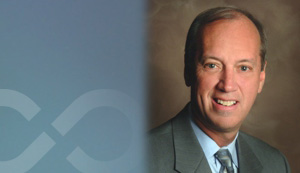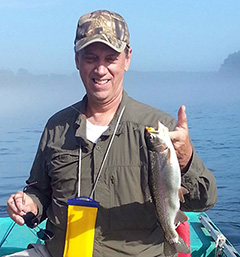Long-time HCRN member McClean retires

More than 30 years ago, a group of academic and community physicians in Indiana launched the Hoosier Oncology Group (or the “HOG”) as a new model for academic and community collaboration in clinical cancer research.
John McClean, MD, a medical oncologist in Galesburg, Ill., was one of the earliest and most enthusiastic community physicians to join the group. Beginning his own practice around the same time as the HOG’s founding, McClean remained active with the organization throughout his career, until his retirement this year.
McClean originally intended to pursue a career in chemical engineering, but through undergraduate coursework in human anatomy, he discovered his strong interest in medicine. He went on to medical school, where he met Patrick Loehrer, Sr., MD, who was starting his training at the same time.
“John and I went to Rush Medical College some time ago,” recalls Loehrer. “There was an outreach campus in Galesburg, Ill., to which I was assigned while John was in the Chicago campus. The purpose of this was to encourage more medical students to work in the rural parts of the state. It always struck me as a bit humorous that John would move to Galesburg and I would move to the big city (Indianapolis).”
Soon after arriving in Galesburg, McClean and three colleagues established a hospice program that is still operating after 30 years. He was also instrumental in bringing radiation oncology to Galesburg, where previously patients had to travel 50 miles one way every day to receive radiation treatments.
While McClean was settling into his practice at Galesburg, Loehrer and his colleagues at Indiana University were beginning to discuss ways to bring clinical research protocols to communities throughout Indiana and the surrounding region. The concept would require a strong collaboration between community physicians and academic researchers. Around 1986, Loehrer invited McClean to be a part of the Hoosier Oncology Group. McClean joined and remained an active contributor for nearly 30 years.
“In the early days of the Hoosier Oncology Group, John was one of the most passionate members of the organization, in participation, study design, and philanthropy,” said Loehrer. “He would even put together a team to play in our Hoosier Oncology Golf Tournament each year.”
HCRN co-founder William Fisher, MD, a medical oncologist at IU Health Ball Memorial Cancer Center in Muncie, Ind., recalls McClean’s commitment to the organization. “Despite living a relatively long distance from Indianapolis in upstate Illinois, John could always be counted on as an attendee at HOG functions. He was a valued contributor to discussions about clinical trial development. In addition, he is a valued friend.”
 The benefits of participation were clear to McClean. “It brought cutting-edge medicine to a small community, and it kept me updated on all the new treatments and new aspects of cancer,” he said. “It’s been a win-win for everybody.”
The benefits of participation were clear to McClean. “It brought cutting-edge medicine to a small community, and it kept me updated on all the new treatments and new aspects of cancer,” he said. “It’s been a win-win for everybody.”
McClean also wanted to have a role in developing research protocols.
“The HOG, more than any other national organization, allowed us to do that,” said McClean. “Now there are many cooperative groups that have community practices involved, but the HOG was one of the first.”
Getting involved in research in a smaller community had its challenges, such as the need to establish and maintain a well diversified institutional review board. But the benefits of collaboration within the network far outweighed the challenges.
“I would look forward to our Hoosier Oncology Group meetings and our big discussions around the table,” he said. “It brought a lot of comfort to me when I came back from HOG meetings, to say, ‘Hey, we’re doing things right in western Illinois.’ It made us all feel very good that we were giving our patients the best care possible.”
In the early 1990s, McClean’s experience with cancer became deeply personal when his wife was diagnosed with advanced ovarian cancer at the age of 37. Through the help of HCRN co-founder Larry Einhorn, MD, McClean contacted a team at the National Cancer Institute that was leading a study involving Taxol. McClean’s wife enrolled on the study and responded well to the treatment, but the disease recurred 5 years later. She underwent high-dose chemotherapy and a stem-cell transplant, and died from complications from those treatments.
McClean’s life changed dramatically then, as he struggled to keep his practice going while caring for his three children, who were going through adolescence. “I was single and taking care of them. … We made it through, but it was a struggle,” he said.
About six years after his wife died, McClean remarried and gained stepsons. The combined family bonded well and still remain close.
Through the loss of his first wife, McClean says he became a better oncologist. “It put me on the other side to know what patients and their families go through. That has really improved my compassion. In that sense, it was a tragic experience, but a good one for me in terms of learning how to care for patients and families.”
“John faced cancer directly and with extraordinary strength as it stole his first wife’s life too early,” said Loehrer. “Over the 35 years I have known him, he remains to me a true role model as a physician, father of three extraordinary children, husband, and a friend.”
McClean always enjoyed bringing advances in cancer treatment to his community. In recent years, he has marveled at the speed of breakthroughs. “Never would I have thought things would change this quickly,” he said. “The tremendous advances that have been made in diagnostic testing and, subsequently, new targeted therapies that have developed — it’s just astounding, the rapid advance that I’ve seen in the last 5 to 10 years.”
While McClean is now enjoying retirement, the practice he built continues as the result of a 2013 merger with Illinois CancerCare, PC, an HCRN member site.
About Hoosier Cancer Research Network:
Hoosier Cancer Research Network (formerly known as Hoosier Oncology Group) conducts innovative cancer research in collaboration with academic and community physicians and scientists across the United States. The organization provides comprehensive clinical trial management and support, from conception through publication. Created in 1984 as a program of the Walther Cancer Institute, Hoosier Cancer Research Network became an independent nonprofit clinical research organization in 2007. Since its founding, Hoosier Cancer Research Network has initiated more than 150 trials in a variety of cancer types and supportive care, resulting in more than 300 publications. More than 4,600 subjects have participated in Hoosier Cancer Research Network clinical trials.

Facebook
Hoosier Cancer Research Network on Facebook
Linked In
You Tube
Twitter